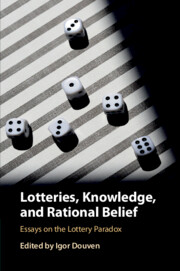Book contents
- Lotteries, Knowledge, and Rational Belief
- Lotteries, Knowledge, and Rational Belief
- Copyright page
- Contents
- Contributors
- Introduction
- Chapter 1 Rational Belief and Statistical Evidence
- Chapter 2 Knowledge Attributions and Lottery Cases
- Chapter 3 The Psychological Dimension of the Lottery Paradox
- Chapter 4 Three Puzzles about Lotteries
- Chapter 5 Four Arguments for Denying that Lottery Beliefs Are Justified
- Chapter 6 Rethinking the Lottery Paradox
- Chapter 7 Rational Belief in Lottery- and Preface-Situations
- Chapter 8 Stability and the Lottery Paradox
- Chapter 9 The Lottery, the Preface, and Epistemic Rule Consequentialism
- Chapter 10 Beliefs, Probabilities, and Their Coherent Correspondence
- Chapter 11 The Relation between Degrees of Belief and Binary Beliefs
- Bibliography
- Index
Chapter 3 - The Psychological Dimension of the Lottery Paradox
Published online by Cambridge University Press: 29 January 2021
- Lotteries, Knowledge, and Rational Belief
- Lotteries, Knowledge, and Rational Belief
- Copyright page
- Contents
- Contributors
- Introduction
- Chapter 1 Rational Belief and Statistical Evidence
- Chapter 2 Knowledge Attributions and Lottery Cases
- Chapter 3 The Psychological Dimension of the Lottery Paradox
- Chapter 4 Three Puzzles about Lotteries
- Chapter 5 Four Arguments for Denying that Lottery Beliefs Are Justified
- Chapter 6 Rethinking the Lottery Paradox
- Chapter 7 Rational Belief in Lottery- and Preface-Situations
- Chapter 8 Stability and the Lottery Paradox
- Chapter 9 The Lottery, the Preface, and Epistemic Rule Consequentialism
- Chapter 10 Beliefs, Probabilities, and Their Coherent Correspondence
- Chapter 11 The Relation between Degrees of Belief and Binary Beliefs
- Bibliography
- Index
Summary
The lottery paradox exposes some tensions in our natural ways of thinking about probabilities, and in how we think about belief itself. This chapter explores the paradox from a psychological angle, arguing that it arises from the flexibility of our cognitive capacities to represent (and reason about) the empirical realm. A better understanding of these capacities can give us a clearer sense of our theoretical options. Ultimately, I take a broad view of the paradox: In my view, it can be triggered not only by discussion of games with stipulated odds but by topics of all sorts. However, it will be simplest to start with an example inspired by Kyburg’s (1961) classic discussion, in which you hold one ticket in a fair lottery, with odds of (let us say) a million to one, in which the draw has been held but the single winner not yet announced. It is very likely that your ticket has lost, but what is the significance of this high likelihood for the rationality of believing that your ticket has lost? If we insist that a threshold of .999999 is not high enough for rational belief, it may seem we are trapping ourselves in skepticism: Surely many of the ordinary things we rationally believe about the world are less certain than logical truths. On the other hand, if we do believe that this ticket has lost, by symmetry we should say the same for any of the other tickets in the lottery, and as long as conjunction of rational beliefs is a rational operation, it seems we would be rational to deduce that all the tickets have lost, in contradiction to our other beliefs about this fair lottery.
- Type
- Chapter
- Information
- Lotteries, Knowledge, and Rational BeliefEssays on the Lottery Paradox, pp. 48 - 73Publisher: Cambridge University PressPrint publication year: 2021
- 3
- Cited by



